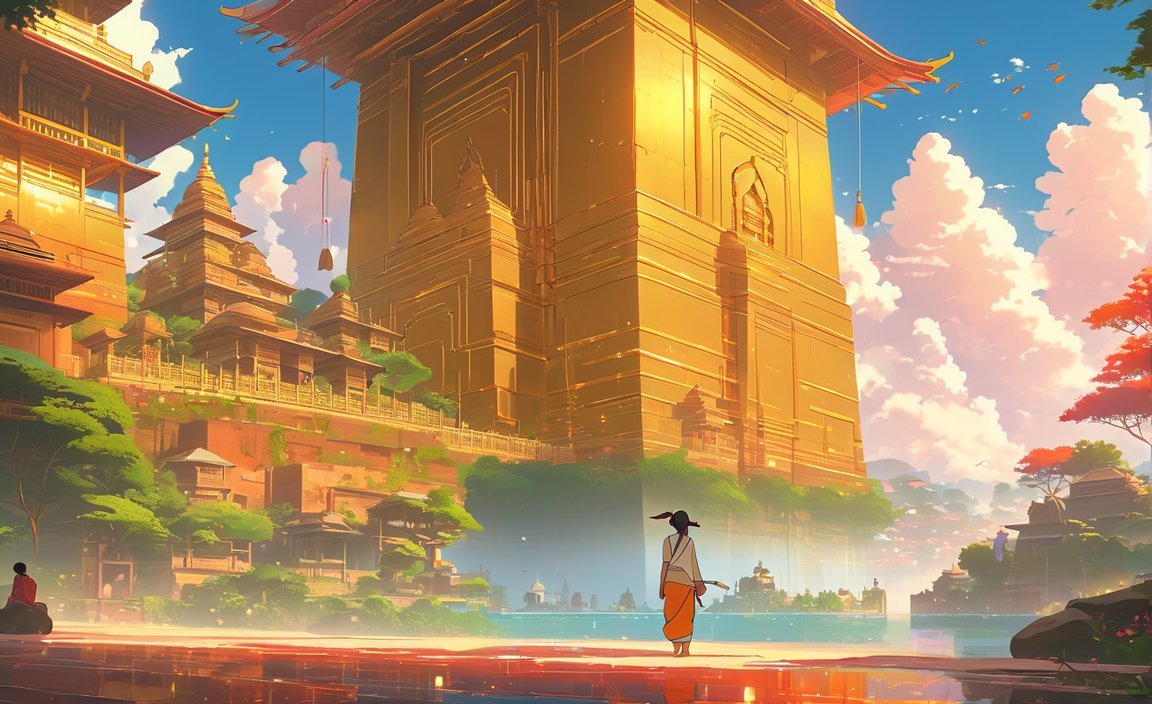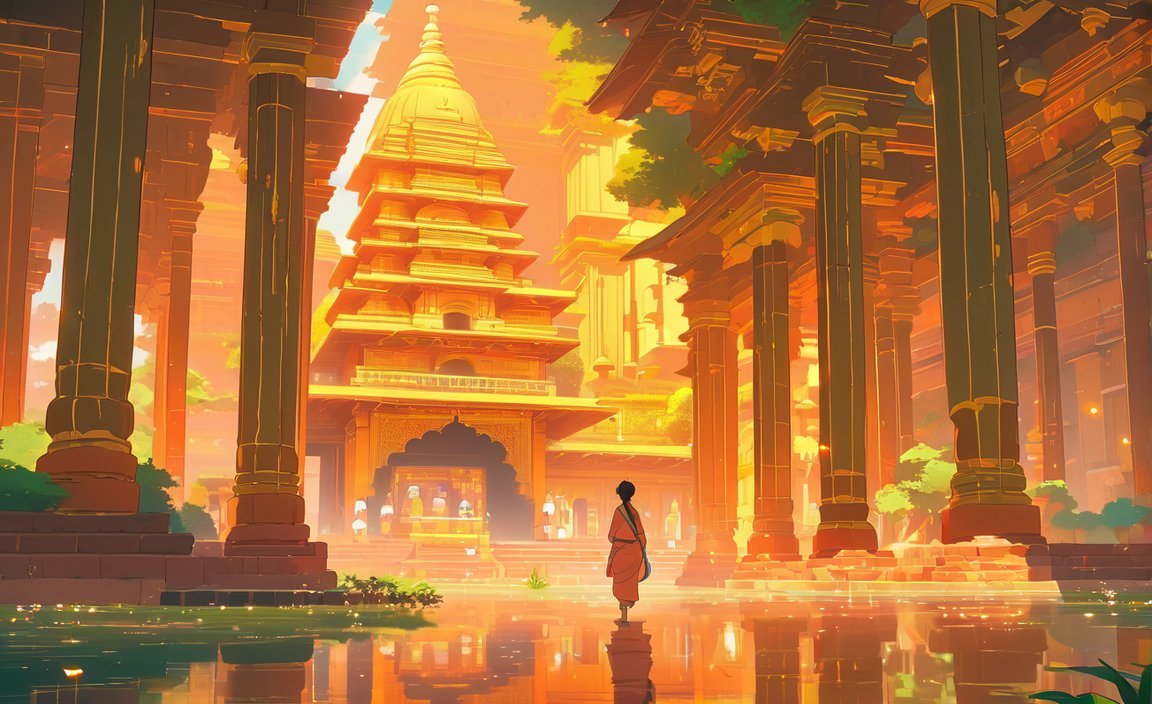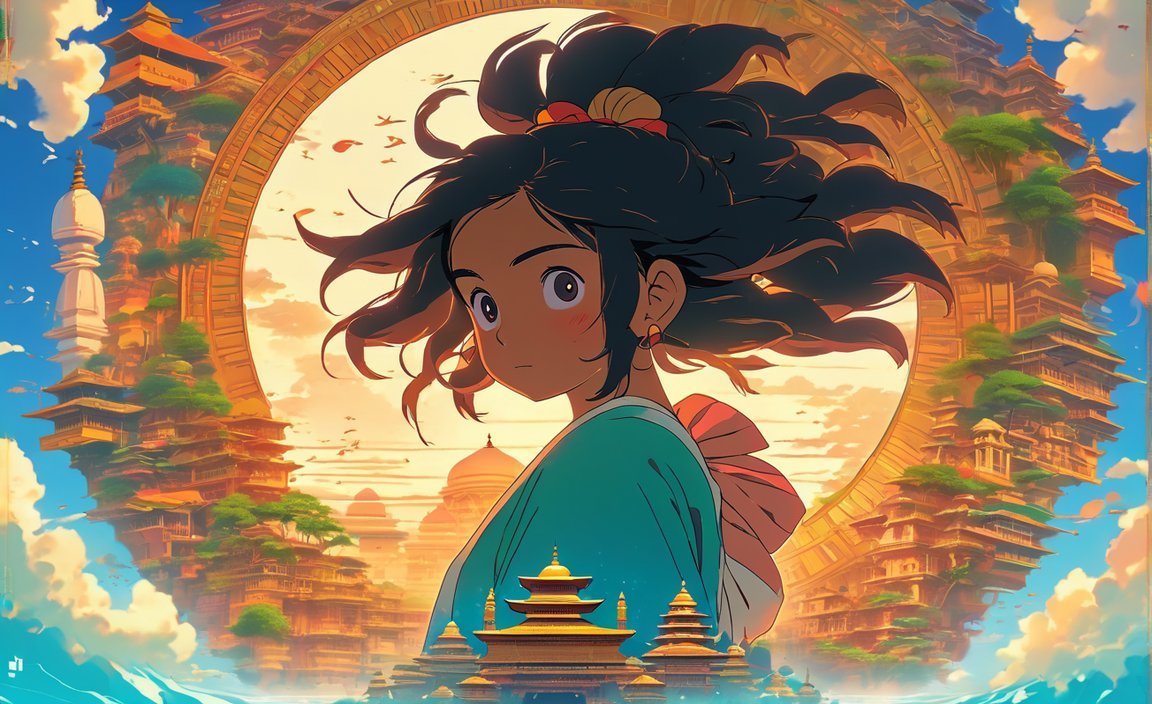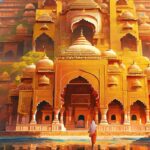Discover the fascinating cool facts about India and delve into a world of astounding wonders. From awe-inspiring architectural marvels to a breathtaking array of wildlife and mouthwatering culinary delights, India is a country brimming with rich heritage and vibrant traditions. Embark on a virtual journey like never before as we uncover hidden gems and unveil captivating facets of this diverse nation. Prepare to be amazed as we bring the magic of India to life and unearth intriguing cool facts that will leave you in awe.

Key Takeaways:
- India is the seventh largest country in the world, spanning 1.27 million square miles.
- Despite having numerous millionaires, a significant portion of Indians live on less than two dollars a day, with around 35% of the population below the poverty line.
- India is recognized as the largest democracy globally and has a rich history dating back to the Indus Valley civilization.
- Cricket holds the title of the most popular sport in India, while cows are considered sacred animals in the country.
- India has a youthful population, with approximately half the population being under 25 years old.
- The word “shampoo” originates from the Indian word “Champu,” meaning “massage.”
- Geographically, India is a peninsula bordered by the Bay of Bengal and the Arabian Sea, with the majestic Himalayas in the north as the world’s highest mountain range.
Cool Facts About India
India, a country known for its rich heritage, vibrant traditions, and diverse culture, is filled with fascinating facts that will leave you in awe. From its ancient civilizations to its natural wonders, India has a lot to offer. Let’s dive into some cool facts about India that will make you appreciate this incredible nation even more.
India: A Land of Diversity and Contrasts
India is a land of contrasts, where ancient traditions coexist with modern advancements. It is the seventh largest country in the world, covering a vast area of 1.27 million square miles. This vastness encompasses a diverse range of landscapes, from the mighty Himalayas in the north to the beautiful coastal areas along the Bay of Bengal and Arabian Sea.
The Oldest and Largest Continuous Civilization
India is known as the oldest, largest, and continuous civilization. Its roots can be traced back to the ancient Indus Valley civilization, which flourished around 2500 BCE. This civilization, with its advanced urban planning and sophisticated drainage systems, laid the foundation for the rich cultural heritage that India boasts today.
Cricket Craze and Youth Power
Cricket is more than just a sport in India; it’s a national obsession. The passion for cricket runs deep in the veins of every Indian. The enthusiasm and excitement during matches can be felt throughout the entire nation. It’s not uncommon to see people glued to their television screens or cheering at stadiums, showcasing their love for this game.
India is also a youthful nation, with around half of its population under the age of 25. This vibrant and dynamic young generation contributes to the country’s energy, creativity, and innovation. It’s no wonder that India is making significant strides in various fields, from technology to arts and sciences.
The Sacredness of Cows
In India, cows are considered holy and are revered by many. They are seen as gentle creatures that symbolize motherhood and the divine. In many parts of India, it is common to see cows roaming freely on the streets, drawing admiration and respect from the locals. The sacredness of cows has deep roots in India’s religious and cultural beliefs.
Unveiling the Origins of Shampoo
Did you know that the word “shampoo” actually originated from India? The word “shampoo” is derived from the Sanskrit word “Champu,” which means “to massage.” In ancient India, herbal extracts and oils were used for rejuvenating hair and promoting scalp health. This practice eventually traveled to the West, leading to the development of modern-day shampoos.
India’s Architectural Marvels
India is renowned for its architectural wonders that showcase the country’s rich history and cultural heritage. One such marvel is the Taj Mahal, a dazzling white marble mausoleum located in Agra. Built by Emperor Shah Jahan as a tribute to his beloved wife, it is hailed as a symbol of eternal love and is recognized as one of the New Seven Wonders of the World.
The Majesty of the Himalayas
India is home to the majestic Himalayas, the world’s highest mountain range. These towering peaks stretch across the northern borders of the country, offering breathtaking views and unparalleled opportunities for adventure. From scaling snow-covered summits to trekking through picturesque valleys, the Himalayas are a haven for nature enthusiasts and thrill-seekers alike.
Conclusion
India is a land of fascinating contrasts, diverse traditions, and captivating wonders. From its ancient civilizations to its vibrant culture, every corner of India has something unique to offer. Whether it’s the devotion towards cricket, the sacredness of cows, or the architectural marvels like the Taj Mahal, India’s cool facts will leave you amazed and inspired. So, embark on a virtual journey to India and explore the magic of this incredible nation.
Table: Notable Facts
| Fact | Source |
|---|---|
| India is the seventh largest country in the world | [^1^]: FactRetriever.com |
| Most Indians live on less than two dollars a day | [^1^]: FactRetriever.com |
| Approximately 35% of India’s population lives below the poverty line | [^1^]: FactRetriever.com |
| India is the largest democracy in the world | [^1^]: FactRetriever.com |
| The name ‘India’ is derived from the river Indus | [^1^]: FactRetriever.com |
| India is known as the oldest, largest, and continuous civilization | [^1^]: FactRetriever.com |
| Cricket is the most popular sport in India | [^2^]: The Fact File |
| Cows are considered holy in India | [^2^]: The Fact File |
| Around half of India’s population is under 25 years old | [^2^]: The Fact File |
| The word ‘shampoo’ is derived from the Indian word ‘Champu’ | [^3^]: Facts.net |
| The Himalayas, which are the world’s highest mountain range, rise in the north of India | [^4^]: New Interesting Facts |
References:
[^1^]: 64 Surprising and True India Facts | FactRetriever.com
[^2^]: 89 Interesting Facts About India That You Should Know | The Fact File
[^3^]: 101 Amazing Facts About India You Must Know
[^4^]: 51 Amazing Facts About India You Must Know
Did you know that Albania has some fascinating and unusual aspects? Explore Albania fun facts to discover more about this intriguing country. Albania fun facts
India is a country with a rich cultural heritage and diverse traditions. Uncover fun facts for India that will leave you amazed and wanting to know more. Fun facts for India
Looking for interesting facts on India? Look no further! Dive into a world of captivating information that will take you on a journey through this captivating country. Fun facts on India
Prepare to be astounded by an interesting fact about India. Unveil the mysteries and wonders that make this country truly unique. Interesting fact about India
Ready to explore some fun Indian facts? Delve into the world of vibrant culture and breathtaking landscapes with these fascinating insights. Fun Indian facts
Are you curious about the United Kingdom? Unearth a collection of UK fun facts that will engage your interest and paint a picture of this captivating nation. UK fun facts
India is the Birthplace of Four Major World Religions
India has a rich and diverse cultural heritage that encompasses a myriad of traditions and beliefs. One remarkable aspect of India’s history is its role as the birthplace of four major world religions. Let’s delve into the fascinating facts about these religions and the profound impact they have had on Indian culture.
Hinduism: A Spiritual Tapestry
- Hinduism, the most widely practiced religion in India, traces its origins back to the Indian subcontinent. It encompasses a vast range of philosophical systems, beliefs, and rituals.
- With approximately 84% of India’s population identifying as Hindus, India is home to around 94% of the world’s Hindu population (source: Pew Research Center)
- The concepts of karma, dharma, and reincarnation are pivotal to Hinduism. These principles influence not only religious practices but also shape the fabric of Indian society.
Buddhism: Finding Enlightenment
- Siddhartha Gautama, popularly known as Buddha, founded Buddhism in ancient India. His teachings laid the foundation for one of the world’s major religions.
- While Buddhism gained prominence in other parts of Asia, it retains its historical significance in India. The country boasts numerous sacred Buddhist sites, such as Bodh Gaya, where Buddha attained enlightenment.
- The influence of Buddhism on Indian culture is evident in the art, architecture, and philosophy that flourished during ancient times.
Jainism: Embracing Non-Violence
- Jainism emerged in India as a distinct religious tradition, emphasizing non-violence, self-control, and compassion toward all living beings.
- This ancient religion, founded by Mahavira, holds a significant place in India’s spiritual landscape. It promotes a lifestyle focused on simplicity, discipline, and adherence to non-violence principles.
- Jain temples, intricately carved with stunning architectural details, stand as testaments to the religion’s rich heritage and cultural contributions.
Sikhism: Harmonizing Faith and Equality
- Sikhism, a monotheistic religion founded in the late 15th century by Guru Nanak Dev, originated in Punjab, a region split between India and Pakistan.
- With its emphasis on equality, community service, and devotion to God, Sikhism has made profound contributions to Indian society. The sacred Golden Temple in Amritsar symbolizes the importance of communal harmony and spiritual unity.
- Sikhism’s tenets of compassion, egalitarianism, and seeking truth resonate deeply with the people of India.
India’s fascinating religious landscape, influenced by these indigenous faiths, exemplifies the country’s deep-rooted cultural and spiritual heritage. The birthplace of Hinduism, Buddhism, Jainism, and Sikhism, India remains a haven for those seeking enlightenment, inner peace, and religious diversity.
Key Takeaways:
- India is the birthplace of four major world religions: Hinduism, Buddhism, Jainism, and Sikhism.
- Hinduism, with around 84% of India’s population identifying as Hindus, is the most widely practiced religion in India (source: WorldAtlas).
- The concepts of karma, dharma, and reincarnation form the core of Hindu beliefs.
- Buddhism, founded by Siddhartha Gautama in ancient India, spread beyond its birthplace but retains its historical significance in India.
- Jainism promotes non-violence, self-discipline, and compassion towards all living beings.
- Sikhism, a monotheistic religion, emphasizes equality, community service, and devotion to God.
- India’s religious diversity is a testament to its rich cultural and spiritual heritage.
India’s Fascinating Vegetarian Culture
India has long been synonymous with vegetarianism, often touted as the country with the largest number of vegetarians in the world. But is this really true? Let’s delve deeper into this fascinating aspect of Indian culture and explore the realities behind the stereotype.
Debunking the Myth
Contrary to popular belief, India is not entirely a vegetarian country. Past estimates suggested that more than a third of Indians followed a vegetarian diet. However, this perception is largely influenced by migration patterns within the country. When people from South India migrate to Northern or Central India, they often adopt the vegetarian cuisine of their new region, reinforcing the idea of India as a predominantly vegetarian nation.
Unveiling the Numbers
According to a Nielsen survey, the city of Indore boasts the highest percentage of vegetarians in India, with 49% of its population adhering to a vegetarian diet. Meerut follows closely behind with 36% of its population embracing vegetarianism. In fact, a staggering 81% of Indians choose to limit their meat intake, and 39% identify as vegetarians. While these numbers are significant, they also reflect a gradual shift towards a more diversified diet, with meat trade and consumption on the rise.
A Model for Vegetarianism
India has indeed earned its reputation as the country with the largest number of vegetarians. In a report by The Guardian in 2013, India was hailed for its vegetarian population, setting an example for the rest of the world. This trend continues today, with recent estimates suggesting that between 23% and 37% of the Indian population chooses a vegetarian lifestyle. Moreover, in 2021, 9% of the Indian population identified as vegan, further emphasizing the country’s inclination towards plant-based diets.
Why Vegetarianism Matters
Vegetarianism is an individual choice with diverse motivations. Some people opt for this dietary approach out of compassion for animals, while others prioritize environmental sustainability or cultural beliefs. The World Economic Forum acknowledges that vegetarianism can be pursued for a variety of reasons, including health concerns and the desire to preserve our planet’s resources.
Key Takeaways:
- India is not entirely a vegetarian country, contrary to popular belief.
- Migration patterns within India contribute to the perception of a largely vegetarian population.
- Indore and Meerut have the highest percentages of vegetarians in India, at 49% and 36% respectively.
- 81% of Indians choose to limit their meat intake, with 39% identifying as vegetarians.
- India has the largest number of vegetarians in the world, although meat trade and consumption are increasing.
Sources:
– The myth of the Indian vegetarian nation – BBC News
– Vegetarianism by Country – Wikipedia
Discover the Fascinating Cool Facts about India
India, known for its diverse culture and rich heritage, never fails to amaze with its unique landmarks and attractions. One such remarkable treasure is the floating post office located on Dal Lake in Srinagar. Let’s dive into the extraordinary world of India’s postal service and uncover more cool facts about this iconic floating post office.
The Only Floating Post Office in the World
Yes, you read it right! India is home to the world’s only floating post office. Situated on the serene Dal Lake in Srinagar, this floating post office is not just a place to mail your letters; it is an architectural marvel that will leave you spellbound. The post office is actually housed in a traditional Kashmiri houseboat, adding to its charm and uniqueness.
A Postal Haven and More
The floating post office on Dal Lake is not just an ordinary post office. Step inside, and you’ll find a philately museum, offering a fascinating glimpse into the world of stamps and their rich history. It’s a haven for stamp collectors and enthusiasts, allowing them to appreciate the artistry and stories behind these tiny treasures. Additionally, a shop selling postage stamps is also housed within the floating post office premises, providing a chance to take home a piece of India’s postal history.
A Tourist Attraction with Scenic Beauty
The floating post office has become a popular tourist attraction and an essential part of any itinerary while visiting the picturesque region of Kashmir. Apart from experiencing the unique postal services, visitors are treated to breathtaking views of the Dal Lake, surrounded by snow-clad mountains. The tranquil setting of this floating post office adds to its allure and makes it a must-visit destination for explorers and postcard enthusiasts alike.
A Testimony to India’s Postal Service
India boasts the largest number of post offices in the world, and the floating post office on Dal Lake beautifully showcases the country’s commitment to its postal service. This architectural feat is a testament to India’s rich postal history, innovation, and dedication to providing postal facilities even in unconventional locations.
An Encounter with Nature’s Fury
In 2014, the floating post office faced the wrath of nature when it was damaged during severe floods. However, the iconic post office was restored, standing tall as a symbol of resilience and determination. Its reopening was a moment of triumph, reminding us of India’s indomitable spirit and commitment to preserving its historical and cultural treasures.
An Experience to Cherish and Respect
When you visit the floating post office, remember to honor tradition and local customs. As a sign of respect, visitors are required to remove their shoes before entering the houseboat. This gesture reflects the deep-rooted values and traditions that prevail in this region, adding to the authenticity and charm of the experience.
India’s Love for Unique Landmarks
India’s floating post office is just one example of the country’s penchant for remarkable landmarks. From towering monuments to intricate temples, India is a treasure trove of architectural wonders that will leave you awe-inspired. While exploring the country, keep an eye out for these extraordinary gems that showcase India’s rich cultural heritage.
Key Takeaways:
- India is home to the world’s only floating post office, located on Dal Lake in Srinagar.
- This unique post office is housed in a traditional Kashmiri houseboat and also includes a philately museum and a shop selling postage stamps.
- The floating post office is a popular tourist attraction and an important part of any visit to the scenic region of Kashmir.
- India has the largest number of post offices in the world, with the floating post office serving as a testament to the country’s rich postal history and dedication to its postal service.
- The floating post office was damaged in the floods of 2014 but was restored and reopened, symbolizing India’s resilience and commitment to preserving its cultural treasures.
- Visitors are requested to remove their shoes before entering the floating post office as a sign of respect.
Sources:

FAQ
Q1: What is the population of India?
A1: India is home to 1.4 billion people, almost one-sixth of the world’s population (Pew Research Center).
Q2: What are the major religions in India?
A2: Hinduism is the most widely practiced religion in India, with about 84% of the population identifying as Hindus. Islam is the second most practiced religion (WorldAtlas).
Q3: Is India a religiously diverse country?
A3: Yes, India is known for its religious diversity, with approximately 80% of the population practicing Hinduism. It is also home to the birthplace of four major religions: Hinduism, Buddhism, Jainism, and Sikhism (Asia Highlights).
Q4: Is vegetarianism common in India?
A4: Yes, vegetarianism is common in India, with past estimates suggesting that more than a third of Indians ate vegetarian food. However, the stereotype of India as a largely vegetarian country is a myth (BBC News).
Q5: Does India have any unique post offices?
A5: Yes, India is home to the world’s only floating post office, located on Dal Lake in Srinagar. It is a popular tourist attraction and showcases India’s rich postal history (India.com).















